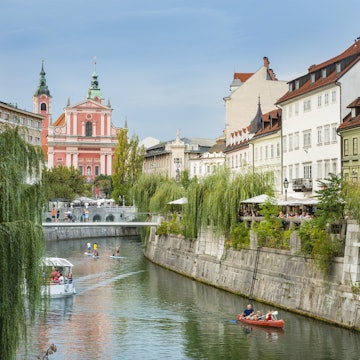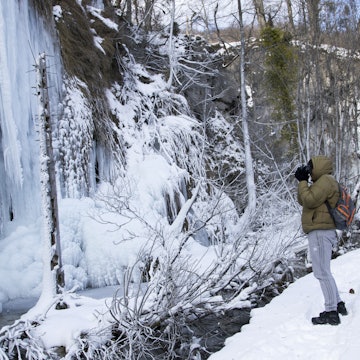

Visiting famous sights such as Lake Bled is easy for most nationalities © Michele Westmorland / Getty Images
It's no mystery why Slovenia has become one of the top destinations in Europe for independent travelers. Within its compact geographical area, visitors can soak up the sun on Adriatic beaches, hike in the Julian Alps, swim in glacial lakes, and kayak on crystal-clear mountain rivers.
With simple visa requirements for most nationalities, Slovenia is an easy place to explore. As well as the great outdoors, there's rich culture waiting to be discovered in the capital, Ljubljana, in historic cities such as Maribor, and in towns, villages and isolated rural communities in every corner of the nation.
Visitors who come to Slovenia are the most sought-after demographic in tourism: independent adventure seekers who demand authenticity and want to understand a place rather than just passing through. Deciding to come here is the easy part; here's what you need to know about visa requirements to make the trip a reality.
Who needs a visa to travel to Slovenia?
Slovenia is one of the 27 member nations of the European Union (EU) and part of the Schengen Area, a network of 26 member countries that have agreed to allow border-free travel. Most travelers from Europe do not require a visa to visit or work in Slovenia for up to three months. You will however need a valid national identity card or passport.
Several countries outside of the EU and the Schengen Area — including the United States, Canada, Australia, New Zealand, the UK and Japan — can travel to Slovenia visa-free. However, these “third-country nationals” can stay no longer than 90 days within any 180 day period. This rule applies to the Schengen Area as a whole, so if you enter Slovenia and travel on to another Schengen Area country, this will count as part of your 90 days. Visa-free visitors must provide valid passports upon entry.

Staying longer than 90 days in Slovenia
EU/Schengen citizens who wish to reside in Slovenia for a longer period will need to apply for a residency registration certificate from the local authorities in the area of Slovenia where they plan to reside. Among the required pieces of information for a residency application, you'll need to provide:
A valid passport
An application for residency
A specific reason for wanting to reside in Slovenia
A passport photo
Proof of financial stability and means of support for the length of your stay in Slovenia
Officially taken and recorded fingerprints
Proof that you have no recent criminal history
Proof of health insurance that provides (as a minimum) cover for emergency care in Slovenia
How to obtain a visa for Slovenia
If you are not from a Schengen Area country and do not quality for visa-free travel, you'll need to apply for a Schengen Area visa, which allows travel within the Schengen Area for up to 90 days for business or tourism. Note that entry applies to the Schengen Area as a whole, so if you travel from Slovenia to another Schengen Area country, this will still count as part of your 90 days.
Travelers from listed countries — including China, India, South Africa, Russia and Turkey — will need to apply for a visa through a Slovenian consulate or embassy in their home country (the Slovenian Ministry of Culture has a list of overseas missions). Applications cost €80 for adults and €40 for children.

Processing times vary but it usually takes just over two weeks to receive a response to the application. Applicants will need to provide include a reason for travel, two passport photographs, proof of health insurance, bank statements (or other information) showing sufficient funds to cover the stay, and information on hotel bookings and flights out of the Schengen Area.
For additional information on what’s needed to enter the country, the Slovenian Ministry of the Interior website outlines the conditions for each nationality. There are plenty of resources online with information on Schengen Area visas, but the EU's official website is a good place to start.
Working in Slovenia
Visitors from Schengen Area countries can work in Slovenia without restrictions. If you come from somewhere else and plan to work for a company in Slovenia, you will need what is known as a 'single residence and work permit' issued by the Employment Service of Slovenia. The government of Slovenia has a special online portal with employment information for third-country nationals.
Additional rules for travel to Slovenia
Regardless of your country of origin or the length of time you plan to stay in Slovenia, it is important to be aware of the latest entry requirements, particularly the rules relating to the pandemic and public health. Border authorities will also expect you to be aware of the customs rules governing what can and cannot be carried into the country. There are import restrictions or limits for a raft of items, including tobacco, alcohol, firearms, cash, and animals.
You may also like:
6 incredible places to swim in Slovenia: From beaches and sand bars to Lake Bled
Get to know Chef Ana Roš in 22 questions
The best things to do in Slovenia from the mountains to the sea
Take your Slovenia trip with Lonely Planet Journeys
Time to book that trip to Slovenia
Lonely Planet Journeys takes you there with fully customizable trips to top destinations – all crafted by our local experts.

























